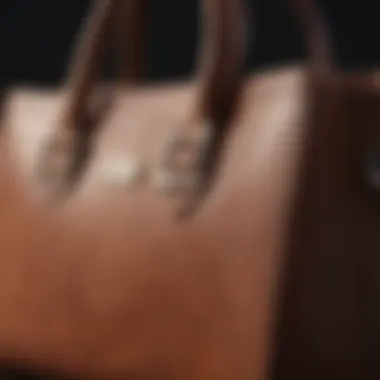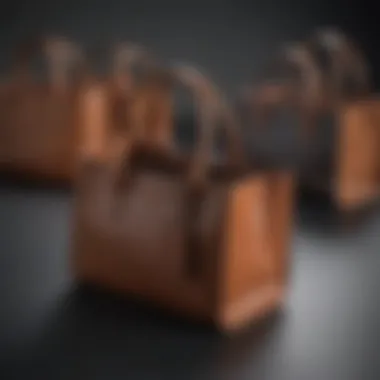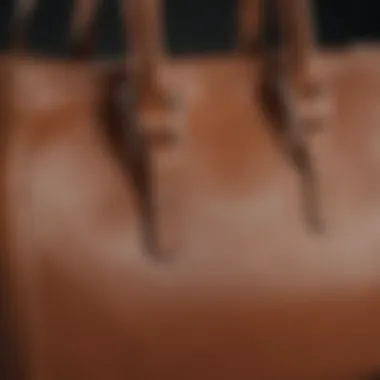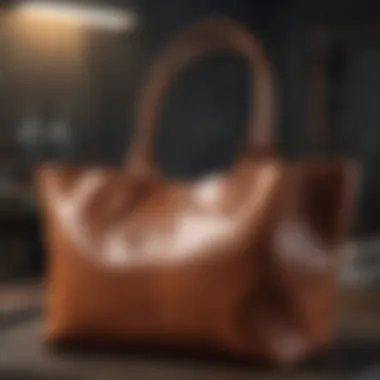The Allure of Small Structured Leather Totes


Intro
The world of fashion is intricate and continually evolving. Small structured leather totes have emerged as significant players in this realm. They serve not only as functional accessories but also as key design statements. The purpose of this article is to examine various aspects of these bags, shedding light on their design philosophy, material integrity, and the intersection of style and practicality.
As fashion enthusiasts seek out pieces that elevate their personal style, small structured leather totes provide a unique blend of elegance and utility. Understanding the details, both aesthetic and practical, can provide valuable insights into choosing the right tote.
This discussion will encompass a variety of topics. We will explore current fashion trends, ethical sourcing, and maintenance practices. In the following sections, readers will gain an appreciation for the nuances that make small structured leather totes essential to contemporary wardrobes.
Preamble to Small Structured Leather Totes
Small structured leather totes have become prominent accessories in contemporary fashion. These bags blend usability with style, making them essential for many women across various settings. Their design balances sophistication with practicality. Fashion lovers and professionals often choose these totes for daily wear or special occasions.
Definition and Characteristics
A small structured leather tote can be described as a handbag characterized by its firm shape and sturdy construction. Typically, these bags have a defined silhouette, which contributes to their structured aesthetic. The size is generally smaller than larger totes, allowing for easy handling while still providing enough room for essentials.
These totes are often crafted from high-quality leather, which enhances durability and elegance. Features often include a single or double handle, a secure closure, and sometimes internal pockets for organization. This combination of elements creates a polished look, suitable for various settings.
Historical Context
The evolution of leather bags is extensive. Leather has been used for centuries for its durability and availability. In the 20th century, with the rise of modern fashion, structured bags began to gain popularity. Designers began to see the value in creating bags that offered both form and function. The small structured leather tote emerged as a response to the need for stylish yet practical accessories that could be utilized in both casual and formal environments. By the late 20th century, brands like Prada and Gucci were integral in popularizing these designs among fashionable consumers.
Significance in Modern Fashion
Today, small structured leather totes hold a special place in the wardrobes of many individuals. They are viewed as a versatile accessory that can complement varying outfits—from casual daywear to professional attire. The appeal lies in their ability to project sophistication while retaining functionality. In a world where fashion trends rapidly change, these totes remain a timeless option. They have become a staple in many fashion-forward closets.
"A well-chosen tote can elevate any outfit, making it a crucial part of an essential wardrobe."
In summary, small structured leather totes represent a union of history, design, and practicality. Their importance in modern fashion underscores the need for accessories that are both aesthetically pleasing and functional.
Materials and Construction
The materials and construction of small structured leather totes significantly impact their durability, aesthetics, and overall appeal. Understanding the types of leather used and the craftsmanship involved helps consumers make informed decisions. This section aims to provide a detailed exploration of leather types and quality indicators that define these bags.
Types of Leather Used
Choosing the right leather is essential for the quality of a small structured leather tote. The three most common types are Full-Grain Leather, Top-Grain Leather, and Bonded Leather. Each type has distinct characteristics that determine its suitability for various uses.
Full-Grain Leather
Full-Grain Leather represents the highest quality in leather types. It retains the entire grain of the hide, making it remarkably strong and durable. This leather develops a rich patina over time, which enhances its visual appeal. The unique feature of Full-Grain Leather is its natural texture, often showcasing imperfections and scars. This characteristic adds authenticity and uniqueness to each tote. However, the main disadvantage is its higher cost compared to other types. Nevertheless, for discerning buyers, the benefits of durability and timeless style make it a favorable choice.
Top-Grain Leather
Top-Grain Leather is the second-highest quality leather available. It is made by removing the top layer of the hide, which creates a smoother appearance. This type strikes a balance between durability and affordability. The key characteristic of Top-Grain Leather is its polished surface, which offers a sleek and sophisticated look. However, it may not develop as rich a patina as Full-Grain Leather over time. For many, it is a beneficial option, combining quality with a slightly lower price point.
Bonded Leather


Bonded Leather is created from scraps of leather that are glued together and then coated with polyurethane. While it is the most affordable option, it lacks the longevity and premium feel of other leathers. The key characteristic of Bonded Leather is its uniform appearance, often resembling real leather at first glance. However, its unique feature is also its downfall; it does not age well and can wear out quickly. Overall, while Bonded Leather is a cost-effective choice for individuals on a budget, it may not provide the satisfaction and durability expected from a quality leather tote.
Craftsmanship and Design Techniques
The craftsmanship behind small structured leather totes plays a pivotal role in defining their quality. Skilled artisans utilize various design techniques including stitching, edging, and finishing. These methods contribute to both durability and aesthetic appeal. High-quality stitching ensures the tote withstands daily use, while careful finishing enhances its visual character. The attention to detail in these processes can elevate the overall craftsmanship of a tote, making it a worthy investment.
Quality Indicators
When evaluating small structured leather totes, several quality indicators should be considered. One key aspect is the feel of the leather; genuine leather offers a tactile experience that synthetic materials cannot replicate. Additionally, the stitching should be consistent and tight. Loose or uneven stitching can signal inferior craftsmanship. Other aspects to consider include hardware quality, the interior lining, and overall design coherence. By assessing these indicators, buyers can ensure they select a tote that aligns with their standards of quality and aesthetics.
"Investing in a high-quality leather tote not only enhances your style, but it also supports sustainable fashion choices as well."
Functional Considerations
Functional considerations are vital in understanding the role of small structured leather totes. This section addresses how these bags serve practical purposes alongside their aesthetic appeal. A thoughtfully designed tote meets various needs while also resonating with personal style. Functionality encapsulates size, capacity, versatility, and internal organization, crucial factors for the modern user.
Size and Capacity
When selecting a small structured leather tote, size and capacity are often top priority. These bags strike a balance between being spacious enough for daily essentials yet compact enough to maintain a sleek appearance. Typically, a well-designed tote can comfortably accommodate items like wallets, phones, and small makeup essentials without appearing bulky. The dimensions can also influence the overall look and feel of the bag.
Versatility in Use
Daily Use
In daily life, small structured leather totes become a staple for many individuals. Their portability makes them a popular choice. The key characteristic is the ease of carrying while holding essential items securely. A unique feature is the ability to transition from casual to semi-formal settings easily. Despite this versatility, a common disadvantage is that not all designs support larger items, which can limit their use for individuals needing more capacity.
Formal Occasions
For formal occasions, the structured design presents an elegant solution. Small structured leather totes bring sophistication to outfits, making them a favorable option. Their tailored look enhances overall attire, offering a refined touch. A distinctive feature is the various colors and finishes available, appealing to diverse tastes. However, some may find that the rigid structure less accommodating for larger items such as clutches or makeup bags.
Travel
When it comes to travel, small structured leather totes exhibit remarkable practicality. They serve as ideal carry-on bags, balancing style and functionality. A notable characteristic is their durability, essential for withstanding the rigors of travel. Additionally, many models include organizational pockets, providing quick access to essentials like boarding passes or travel documents. On the downside, due to their size, they may not be suitable for longer trips requiring multiple items.
Organization and Layout
Effectively organizing contents in a small structured leather tote ensures convenience and ease of access. Smart layouts feature multiple compartments or pockets, allowing for better categorization of items. This can ensure that everything has a designated spot and can be retrieved quickly when needed. The organization not only maximizes usability but also adds to the aesthetic nature of the bag, keeping everything tidy and presentable.
Styling a Small Structured Leather Tote
Understanding how to style a small structured leather tote can greatly enhance a woman's outfit, providing both functionality and elegance. These bags, known for their clean lines and sophisticated design, serve as versatile accessories that can complement various looks. By knowing how to pair them effectively with wardrobe essentials, women can elevate their fashion while remaining practical. The benefits of styling these totes include bringing together different elements of an outfit and showcasing individual style.
Pairing with Wardrobe Essentials
Casual Outfits
Casual outfits often prioritize comfort without sacrificing style. A small structured leather tote can add a refined touch to what might otherwise be a simple look. Key characteristics of casual outfits include relaxed fits and easy combinations of basic pieces. Adding a tote not only enhances the outfit but also introduces texture and color, setting a balanced tone.
Unique features of casual outfits would be their ability to transition from day to night effortlessly. This versatility is a significant advantage, as it allows for quick changes in style. However, it's essential to maintain a balance; too many bold elements can overwhelm the simplicity that casual wear aims for.


Office Attire
Office attire focuses on professionalism while allowing for personal expression. A small structured leather tote fits perfectly within this context, offering a polished appearance. Its clean silhouette can convey confidence and competence. The key characteristic of this attire is its blend of structure and comfort, which is essential in a workplace environment.
This type of outfit typically emphasizes items like blazers, tailored pants, and blouses. A structured tote can enhance the overall professionalism while also providing necessary functionality for carrying business essentials. The unique feature in office attire is the opportunity for statement pieces, and a leather tote can serve as one.
However, caution should be exercised to ensure the choices align with workplace dress codes. Opting for classic colors like black or navy, paired with neutral outfits, ensures elegance.
Evening Wear
Evening wear is an expression of personal style and often involves a more glamorous approach. Here, a small structured leather tote can be an unexpected but stylish choice. The key characteristic of evening wear is its emphasis on sophistication and elegance, often incorporating luxurious fabrics and striking details.
The unique feature of pairing a structured tote with evening attire lies in its contrast with more flowing silhouettes. This juxtaposition can create a striking visual effect. However, one must be aware of the overall balance; if the tote is too bulky or detailed, it may detract from the elegance of the outfit.
Color Schemes and Trends
When selecting a small structured leather tote, it's important to consider the color schemes that best complement your wardrobe. Current trends emphasize neutral tones, which are versatile and timeless. Shades like beige, gray, and black provide an excellent base to work with, allowing for easy pairing with a variety of outfits. Bright colors can also make a statement, but they should be chosen based on personal style and occasions. Understanding which colors work with your existing clothing will aid in making the right choice.
Accessorizing with Totes
Accessorizing with small structured leather totes includes various elements that can enhance one's overall appearance.
Jewelry
Jewelry plays a crucial role in completing an outfit. When it comes to accessorizing with a tote, minimalist jewelry often complements the bag's structured aesthetic. Key characteristics of jewelry include the ability to convey personal style and elevate a look. By opting for subtle pieces, such as delicate necklaces or small earrings, one can keep the focus on both the tote and the outfit without overwhelming.
The unique feature of a modest jewelry choice is that it is less likely to clash with the tote, maintaining a coherent appearance. However, excessive or mismatched jewelry may detract from the overall harmony of the look.
Shoe Choices
Shoe choices also impact the effectiveness of styling a tote. Whether opting for heels or flats, the right shoes can enhance the bag's chicness. The key characteristic of shoe choices is versatility; they must align with both the occasion and the outfit's formality. Structured totes can look great with sleek heels that add height and elegance.
A unique feature of coordinated shoe and tote combinations is their ability to create a polished look. However, mismatched styles can lead to dissonance in an outfit, which is best avoided.
Outerwear
Outerwear can significantly affect the overall styling of a small structured leather tote. The key characteristic here is the layering effect created between clothing items. Choosing the right outerwear can either enhance or overshadow the tote. Tailored coats or structured jackets are beneficial choices as they echo the lines of the tote.
A unique feature of cohesive outerwear and tote styling is how they can work together to create a refined silhouette. Conversely, oversized jackets or casual outerwear can diminish the structured look that is vital to the bag's appeal.
To achieve a well-rounded look with a small structured leather tote, balance between various elements such as clothing, accessories, and footwear is key.
Maintenance and Care
Maintaining small structured leather totes is essential for their longevity and aesthetic appeal. Leather, as a natural material, requires thoughtful care to preserve its unique characteristics and prevent deterioration. The process of maintaining these totes involves specific cleaning, storage, and long-term care practices which ensure they remain functional and stylish over time. Proper care can protect against everyday wear and add years to their lifespan.
Cleaning Techniques


To keep your leather tote looking pristine, regular cleaning is crucial. Accumulated dirt and oils can damage the leather if left unchecked. Here are some effective strategies for cleaning:
- Dust and Wipe: Use a soft, dry cloth to regularly dust off the surface. This helps maintain the luster and removes superficial grime.
- Mild Soap: For deeper cleaning, opt for a solution of mild soap and water. Dampen a cloth with the mixture, then gently wipe the tote. Avoid soaking the leather, as excess moisture can lead to damage.
- Specialized Cleaners: Consider using products specifically designed for leather care. Brands such as Lexol and Leather Honey provide effective cleaning solutions without harming the material.
"The right products not only clean but also condition, maintaining the leather's supple nature."
Storage Solutions
Storing your leather tote correctly is key to its preservation. Improper storage methods can lead to shape loss and surface damage. Below are some guidelines:
- Avoid Overcrowding: Store your tote in a cool, dry place. When not in use, keep it in a dust bag to prevent scratches and exposure to dust.
- Shape Support: Use packing material, such as tissue paper, to help maintain the bag's structure. This prevents collapsing or creasing when stored.
- Avoid Direct Sunlight: Excessive sunlight can fade colors and dry out leather. Store the tote away from direct sunlight to retain its hue and texture.
Long-Term Care Practices
Long-term care is necessary to keep your leather tote in excellent condition through time. Consider these practices:
- Conditioning: Regularly apply a leather conditioner. This maintains moisture levels and prevents cracking. Suggested options include Bickmore and Chamberlain's Leather Milk.
- Rotation: Avoid using the same tote every day. Rotating with other bags allows each to rest and recover from wear.
- Professional Restoration: For serious damage, consult a professional leather restoration service. They can help repair cracks, restore color, and maintain the bag's integrity.
By incorporating these maintenance and care practices, your small structured leather tote will remain a vibrant and functional accessory for years to come.
Ethical Considerations in Leather Fashion
The discussion surrounding leather fashion goes beyond aesthetics; it inherently includes ethical considerations that are vital to understanding the full impact of small structured leather totes. As these accessories gain popularity, it becomes essential to address not only their appeal but also the implications of their production and consumption. The ethical concerns encompass sustainability, environmental impact, and consumer responsibility, each element underpinning a growing awareness amongst consumers about the products they choose to purchase.
Sustainable Sourcing of Materials
Ethical fashion advocates emphasize the need for sustainable sourcing of materials. In leather production, this refers to the methods used to obtain animal hides, which can influence both environmental and animal welfare standards. Sourcing hides from producers who utilize ethical farming practices ensures that the animals are treated humanely. Additionally, it promotes agricultural practices that minimize ecological disruption. Consumers increasingly prefer brands that can attest to such responsible sourcing practices, reflecting a societal shift towards sustainability in fashion. Without this sustainable approach, the environmental repercussions can be significant, encompassing deforestation and concentrated waste outputs from tanning processes.
Impact of Leather Production
The environmental footprint of leather production is another crucial area of focus. The tanning process, often reliant on harmful chemicals, presents a serious threat to ecosystems. Water pollution and resource depletion are substantial risks when leather is manufactured using conventional methods. Moreover, livestock farming is a leading contributor to greenhouse gas emissions. Therefore, many brands are exploring alternative tanning methods, such as vegetable tanning, which relies on natural ingredients instead of synthetic chemicals. The commitment to less harmful processes and environmental responsibility plays a key role in preserving our natural resources while satisfying consumer demand for leather goods.
Consumer Responsibility
As consumers, the responsibility extends to making informed choices that align with ethical standards. Purchasing small structured leather totes from brands that demonstrate transparency in their supply chain can lead to more sustainable fashion practices. Awareness regarding the lifecycle of a product encourages individuals to consider the implications of their purchases. This commitment to ethical consumption not only supports talented artisans but also compels manufacturers to adopt better practices. Every tote bought can represent a choice towards a more ethical fashion landscape, emphasizing the role of consumers in shaping industry standards.
"Ethical consumption is not just a trend; it is a shift towards a more conscious society that values responsibility in all aspects of life."
In summary, ethical considerations in leather fashion enhance the conversation around small structured leather totes. By addressing sustainable sourcing, the environmental impact of production, and the importance of consumer responsibility, individuals can contribute to a positive shift in the industry. This awareness not only benefits fashion enthusiasts but also supports broader ecological and social welfare initiatives.
Closure
In concluding this exploration of small structured leather totes, it is essential to discuss their relevance in contemporary fashion and everyday life. These bags symbolize a blend of functionality and style; they serve not merely as accessories but as practical tools for modern living. By addressing the nuances involved in their design, construction, and ethical sourcing, we gather insights into how these totes represent wider consumer values in today’s market.
Recap of Key Points
Throughout this article, we highlighted several vital aspects regarding small structured leather totes:
- Materials: The discussion included various types of leather, such as full-grain and top-grain, emphasizing their unique characteristics and durability.
- Craftsmanship: We explored the intricate craftsmanship involved in producing these totes, showcasing how artisan techniques contribute to their appeal and quality.
- Functionality: Versatility in usage for casual, office, or travel scenarios was detailed, underscoring the practical nature of these bags.
- Styling: Effective fashion advice was offered on pairing these totes with various outfits, thus demonstrating their role in completing a look.
- Maintenance: Comprehensive maintenance tips ensure the longevity of these products, reinforcing the idea of investment in quality.
- Ethical considerations: The examination of sustainable practices and consumer responsibility highlighted the growing awareness surrounding fashion consumption.
Final Thoughts on Small Structured Leather Totes
Small structured leather totes hold an esteemed position in fashion, combining heritage with modern sensibilities. They are not just trends; they are investments that reflect personal style and a commitment to quality. As consumers increasingly value sustainability and ethical production, these totes exemplify a thoughtful approach to fashion choices. Choosing a small structured leather tote not only enhances one's wardrobe but also contributes to a broader conversation about responsible consumerism.
The relevance of these bags transcends mere aesthetics; it intertwines with lifestyle and values. As women of various ages seek accessories that are both stylish and functional, small structured leather totes consistently meet these needs, making them a timeless addition to any collection.



